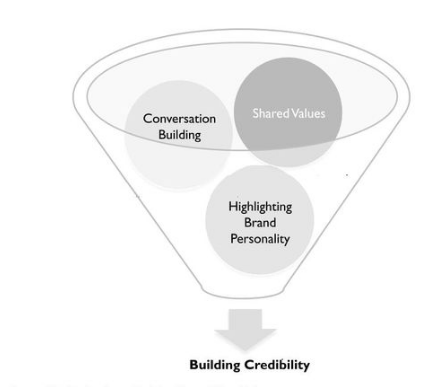Hello readers!
In this blog I am going to explain how businesses can create engagement through building credibility. I hope you find it useful as I did when I was writing it and that it clarifies the topic for you!
Social media has changed the way organisations communicate with stakeholders. Consumers are now, active participants in adding value to the companies and social media has become an essential part of marketing strategies. Companies need to explain and inform stakeholders the factors that will help them build and maintain relationships and invest in them to make them strong with the activities on the brand page, (e.g. posts and media uploads) and the reactions from the users, (Popp, Horbel and Woratsche,2015) .
Facebook is the biggest social media networking site with 1.86 billion monthly active users, (Zephoria, 2017) used as other many social media platforms, to achieve important marketing goals such as relationships with the brand, brand interaction and to increase customer loyalty. The combination between the activities from the company and the users create a Facebook page and it contributes to its success, (Popp, Horbel and Woratsche,2015).
Click in this link to watch a video on how to improve engagement for your business https://www.youtube.com/watch?v=DaE7kmjuisU
Engagement is one of the concepts that explains the consumers’ role when creating consumer-brand relationships. According to McGur (2014), understanding engagement is the way to understand the value of social media marketing. “Engagement is the interaction between people and brands in social media” McGur (2014). In Facebook, these are the likes, comments and shares.
Marketers see engagement as a key target to achieve objectives such as positive word of mouth, product sales and product innovation. Businesses need to be patient until they see results because engagement requires trust and credibility. To make people trust your brand, businesses need to create valuable content, experience and relationships, (Popp, Horbel and Woratsche,2015).
With Social Media, companies are not just a brand communicating on the platform, people see them as having a personality and credibility is essential to create engagement and therefore relationships. It is the public’s perception of a brand’s expertise and trustworthiness. When used effectively, the following three categories tend to build the credibility for brand communities.
CATEGORIES THAT INFLUENCE CREDIBILITY IN SOCIAL MEDIA PLATFORMS
Mae Kim, C. (2016) Social Media Campaigns
- Highlighting brand personality:
“Brand personality is the set of human characteristics associated with the brand”. (Moe Kim, 2016)
This method includes specific actions and tactics that build personality. Companies using this method of engagement try to enhance the perception of their expertise, trustworthiness and reputation, (Mae Kim. 2016).
For instance, showing how the business maintains relationships in the community, demonstrating their expertise in certain area or any activity that humanises the brand.
Businesses need to know that credibility is not a permanent state. The perceptions from the public with which they interact can change and that is why consistency is so important in social media. The posts from a brand on Facebook can interfere with the personality of the brand in previous occasions and this could lead to losing relationships, (Mae Kim, 2016).
- Conversation building:
Building conversations contributing to, interacting with and responding to communications from publics. Writing and the approach to the message is crucial because it contributes directly to credibility, (Mae Kim, 2016). There are 4 areas to consider:
- Engagement speed: If the response is rapid, public will feel that the platform is accurate and the brand is active. If the communication lacks or is slow and poor, people may thing that the brand is hiding something or that the brand isn’t interesting.
- Brand accessibility: Businesses need to be active in social media platforms to create possible access from stakeholders into the brand.
- Transparency: it leads to a more customer centric atmosphere which leads to deeper relationships with stakeholders humanising the brand and making customers feel there is a personal connection, (Zucal, 2016).
Individualised communication: Social media requires interactions that are more like a face-to-face conversation. These personal conversations increase the quality of the relationships and credibility. Mechanised communication must be avoided, (Mae Kim, 2016)
- Shared values:
Showing how the brand community and the organisation have common interests and values is a powerful tool to build credibility, (Mae Kim, 2016). Values that the community consider important and even better if they help in a positive way the community. This concept is called Corporate Social Responsibility (CSR). For instance, a company that is dedicated at upcycling furniture will have a great concept to share with people in social media platforms about how to reduce landfill waste.
I hope you enjoyed this post. I found it very interesting whilst I wrote it and I have learnt a lot doing it. Especially because when I read about engagement, a lot of other different concepts came up and everything seemed to be a bit confusing.
Thanks for reading!
Lara
REFERENCES
Mae Kim, C. (2016) Social Media Campaigns, Strategies for Public Relations and Marketing, E-book, Routledge: London, chapter 4, pp. 88-140 [Accessed date: 18th April 2017].
McGurk, S. (2014) What is Social Media Engagement and why it matters to your Business? Fussionfarm, A Digital Marketing & Creative Agency, [Online] Available: http://blog.fusionfarm.com/what-is-social-media-engagement-and-why-it-matters-for-your-business [Accessed date: 14th April 2017].
Popp, B., Wilson, B. Horbel, C. and Woratschek, H. (2015) Relationship building through Facebook Brand Pages: the Multifaceted Roles of Identification, Satisfaction and perceived Relationship Investment, pp. 278-294.
Zephoria Digital Marketing (2017) The Top 20 Valuable Facebook Statistics [Online] Available: https://zephoria.com/top-15-valuable-facebook-statistics/ [Accessed date: 14th April 2017].
Zucal, C. (2016) Why Transparency Matters to your Business? [Online] Available: http://www.socialmediatoday.com/social-business/why-transparency-matters-your-business-1 [Accessed date: 14th April 2017].


